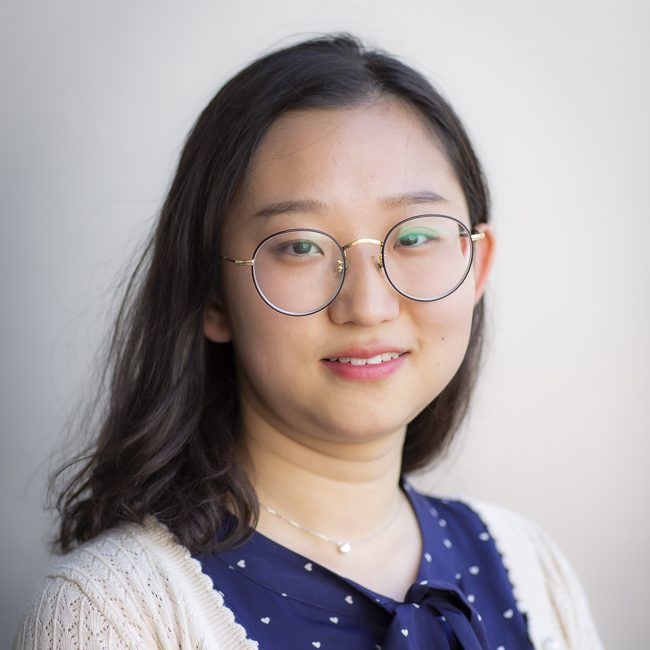
Haoyu Yang
The University of Melbourne
Haoyu Yang is a Master of Science (Bioinformatics) student at the University of Melbourne. She completed a Bachelor of Biomedicine (Honours) at the University of Melbourne in 2018, majoring in biochemistry and molecular biology, with an honours research project at the Peter MacCallum Cancer Centre, investigating therapeutic combinations to treat multiple myeloma. She is currently doing her master’s research project at the Walter and Eliza Hall Institute of Medical Research (Ritchie laboratory) and the project aims to benchmark currently available data analysing tools for scATAC-seq – single cell Assay for Transposase-Accessible Chromatin using sequencing. Haoyu is currently interested in pursuing a PhD degree in bioinformatics.
Can you give me a quick overview of the type of mathematics you are studying and its potential impacts for the broader community
I am studying probability and statistics as part of my masters degree. They provide the foundation for my research project, which is benchmarking currently available data analysing tools for scATAC-seq – single cell Assay for Transposase-Accessible Chromatin using sequencing. scATAC-seq is a sequencing method for chromatin accessibility at single cell level, which can be used to understand heterogeneity of tissues or cell populations from the chromatin perspective. Through learning probability and statistics, I am able to understand lots of algorithms used in scATAC-seq analysing tools. In our daily life, probability and statistics are important for many aspects, for example, the suggesting algorithms used in lots of websites.
You attended AMSI BioInfoSummer, what drew you to this event? What was the most valuable part of AMSI BioInfoSummer for you in terms of furthering your career in mathematical sciences?
I attended AMSI BioInfoSummer to develop my maths and bioinformatic skills and to communicate with bioinformatics researchers across Australia. The workshops were well organised in different levels and the content was closely related to my research field. The opportunity to network with other students and researchers was also very valuable.
In what ways has the experience impacted your maths studies? Did this event lead to any new contacts, projects, collaborations?
Through attending this event, I am able to link the mathematical theories learnt at university to real-life applications for solving various biological problems. This event also hosted lots of speakers, which broadened my view of the application of mathematics. In terms of my research, I exchanged contacts with many students and researchers, and we discussed lots of research ideas.
Where do you see yourself in five or ten years time?
In five- or ten-years’ time, I hope to finish a PhD and become a bioinformatics researcher who can apply and implement mathematical and statistical methods to solve problems in biology. There will be more and more data generated through sequencing in the future. Being able to analyse them will benefit the biomedical research and therefore, benefit enhancement of understanding of disease and generation of effective treatments.
Did you learn about new career options available to you that you were not aware of prior to attending AMSI BioInfoSummer?
Yes, BioInfoSummer hosted a career discussion panel that provided lots of insight in career options. Before attending AMSI BioinfoSummer, I was only familiar with scientific researchers. Now I know about more career options such as consulting, bioinformatician in companies and data analyst. We can apply our coding skills and math skills to many fields, not only for solving biological problems.
How important was receiving a CHOOSEMATHS grant in terms of your ability to attend and fully participate in the AMSI BioInfoSummer 2019 sessions throughout the week?
The CHOOSEMATHS Grant covered the cost of my flights and accommodation for the five-days of BioInfoSummer. I was fully able to enjoy attending this event without worrying about expenses. Otherwise, I would not have been able to afford to attend. I found this CHOOSEMATHS Grant on the AMSI BioInfoSummer website and my supervisors encouraged and helped me to apply for it.
How important are initiatives such as the CHOOSEMATHS Grants in terms of fostering the participation and achievement of women in mathematics, particularly in terms of access to networking opportunities and further training opportunities?
Funding opportunities like CHOOSEMATHS Grants encourage women in Australia to improve their mathematical skills to help them find better career opportunities. By providing networking opportunities and further training opportunities, women in mathematics can share valuable experience and support each other to face the challenges in their research or study.
The CHOOSEMATHS Grants are part of a broader program being delivered by AMSI Schools with support from BHP Foundation to turn the tide on Australia’s maths deficit and strengthen maths education and participation of women across the discipline. What do you see as the big challenges facing maths in Australia, particularly for women?
From my own perspective, the lack of senior female role models in the mathematics field is a big challenge for maths in Australia. Women need more encouragement and inspirations to step into maths. Moreover, maths is the foundation of many STEM subjects and also computer science and data analysis. However, my maths experience in university is not enough for my research and I have to learn maths by myself.
Best piece of advice you’ve received?
We are in an era of continuing learning and it is essential to keep learning and never stop.
If a peer asked you if they should attend AMSI BioInfoSummer, how would you describe the conference to them?
By attending AMSI BioInfoSummer, you will get exposure to researchers and ideas in different levels in bioinformatics and computational biology fields. You can hear the current research ideas from many speakers, get hands-on experience in workshops and build valuable networks with fellow students and researchers.

